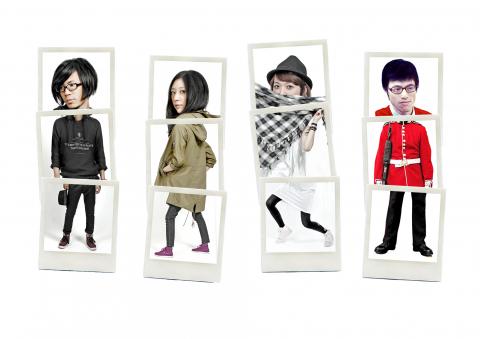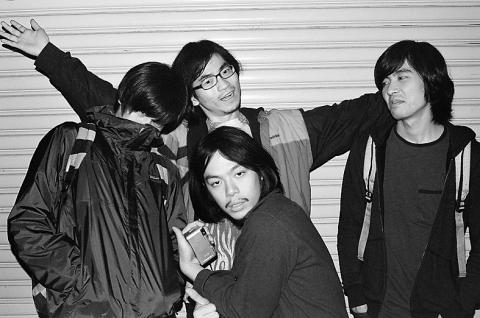Indie rock fans in Kaohsiung are being offered variety tonight, with live music from one band that wields pop rock noise on electric guitars and another that pumps out beats on laptop computers.
Both aim to have the audience dancing. Touming Magazine (透明雜誌) and Unfamiliar Friends Party (不熟的朋友派對), both based in Taipei, are performing at the Pier 2 Art District (高雄駁二藝術特區) to promote newly released CDs.
Touming Magazine’s guitar-heavy sound and tightly arranged songs clearly nod to their musical heroes, mostly American alternative rock bands from the late 1980s and early 1990s like the Pixies, Weezer and Superchunk.

Photo Courtesy of Unfamiliar Friends Party and Touming Magazine
Twenty-eight-year-old Hung Shen-hao (洪申豪), who is the frontman of the four-piece group and mostly sings in Mandarin, says he feels “young people” don’t share the same musical tastes as the band, but that doesn’t bother him. “We just play the music we like,” he told the Taipei Times.
Touming Magazine recently released a full-length debut album titled Soul Music (我們的靈魂樂), and its pep and solid repertoire ought to have concertgoers moving to the music.
The evening starts with a set of electronica rock from Unfamiliar Friends Party. Tonight’s show is being billed as the band’s official release party in Kaohsiung for its new six-song EP titled Headstrong (頭好壯壯).

Photo Courtesy of Unfamiliar Friends Party and Touming Magazine
Unfamiliar Friends, a four-piece group (currently a trio with one member studying abroad), performs all of its music on Macbooks, MIDI controllers and electronic keyboards.
The group’s beats favor new wave rock grooves, and the music is full of spacey atmosphere with melodies built on video game-like sounds.
“All the people that hear our music say it’s joyful,” band member Lily Chen (陳郁欣) said.

In the March 9 edition of the Taipei Times a piece by Ninon Godefroy ran with the headine “The quiet, gentle rhythm of Taiwan.” It started with the line “Taiwan is a small, humble place. There is no Eiffel Tower, no pyramids — no singular attraction that draws the world’s attention.” I laughed out loud at that. This was out of no disrespect for the author or the piece, which made some interesting analogies and good points about how both Din Tai Fung’s and Taiwan Semiconductor Manufacturing Co’s (TSMC, 台積電) meticulous attention to detail and quality are not quite up to

It is one of the more remarkable facts of Taiwan history that it was never occupied or claimed by any of the numerous kingdoms of southern China — Han or otherwise — that lay just across the water from it. None of their brilliant ministers ever discovered that Taiwan was a “core interest” of the state whose annexation was “inevitable.” As Paul Kua notes in an excellent monograph laying out how the Portuguese gave Taiwan the name “Formosa,” the first Europeans to express an interest in occupying Taiwan were the Spanish. Tonio Andrade in his seminal work, How Taiwan Became Chinese,

April 21 to April 27 Hsieh Er’s (謝娥) political fortunes were rising fast after she got out of jail and joined the Chinese Nationalist Party (KMT) in December 1945. Not only did she hold key positions in various committees, she was elected the only woman on the Taipei City Council and headed to Nanjing in 1946 as the sole Taiwanese female representative to the National Constituent Assembly. With the support of first lady Soong May-ling (宋美齡), she started the Taipei Women’s Association and Taiwan Provincial Women’s Association, where she

Mongolian influencer Anudari Daarya looks effortlessly glamorous and carefree in her social media posts — but the classically trained pianist’s road to acceptance as a transgender artist has been anything but easy. She is one of a growing number of Mongolian LGBTQ youth challenging stereotypes and fighting for acceptance through media representation in the socially conservative country. LGBTQ Mongolians often hide their identities from their employers and colleagues for fear of discrimination, with a survey by the non-profit LGBT Centre Mongolia showing that only 20 percent of people felt comfortable coming out at work. Daarya, 25, said she has faced discrimination since she